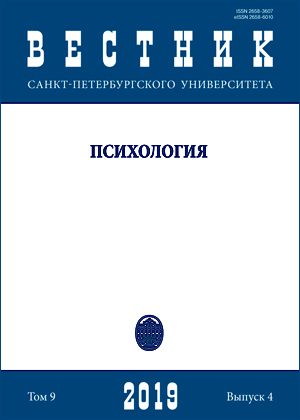The role of theory of mind in the development of humor understanding by children 4–6 years old
DOI:
https://doi.org/10.21638/spbu16.2019.405Abstract
The article presents the results of a study on the relationship between understanding humor and theory of mind — a system of mental representations concerning mental phenomena (knowledge, emotions, intentions, etc.) that develops throughout life and is especially intense in childhood. The basis of the work is the assumption that theory of mind is a mental foundation that allows you to separate your own and other people's mental experience, and explain the cognitive mechanisms of humor. The participants were 40 children of two age groups (4 and 6 years old). Data was obtained on various aspects of understanding the mental world and intellectual development. Methodological tasks were also developed to evaluate the emotional and cognitive components of humor. For this purpose children's jokes were used containing an interaction of heores. The results illustrated age dynamics in the development of theory of mind and an understanding of humor (more pronounced in the case of the emotional component). Jokes were fairly difficult for children 4–6 years old according to the results, which indicated that the level of emotional understanding was below cognitive. Correlation analysis showed a connection between the general indicator of understanding of mental states and humor, while a closer relationship was found with the cognitive component of understanding. In general, the results support the idea of cognitive mechanisms of perception of humor described in Russian literature and expand the empirical database collected by foreign researchers.
Keywords:
theory of mind, understanding of mental states, understanding of humor, understanding of comedic, preschool age
Downloads
References
References
Downloads
Published
How to Cite
Issue
Section
License
Articles of "Vestnik of Saint Petersburg University. Psychology" are open access distributed under the terms of the License Agreement with Saint Petersburg State University, which permits to the authors unrestricted distribution and self-archiving free of charge.




